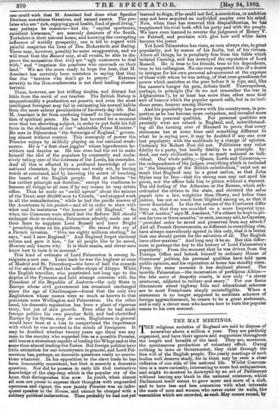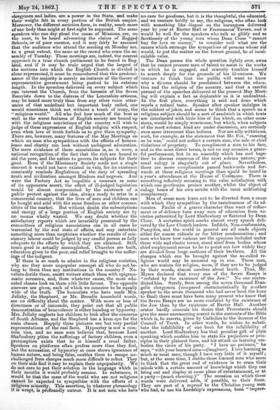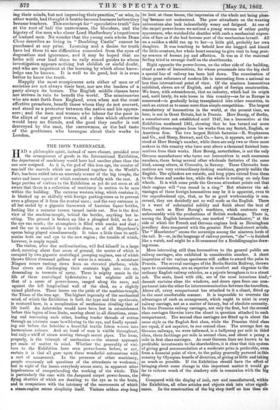THE MAY MEETINGS.
THE religious societies of England are said to dispose of somewhat above a million a year. They are perfectly organized, and have their agents and supporters throughout the length and breadth of the land. They are, moreover, the spontaneous production of voluntary effort. Owing nothing to laws or Government, they exist through the free will of the English people. The yearly meetings of such bodies well deserve study, for in them may be seen a clear reflexion of one side of the national life. Whilst Convoca- tion is a mere curiosity, interesting to none but antiquarians, and might to-morrow be destroyed by an act of Parliament without leaving any blank in the national existence, whilst Parliament itself seems to grow more and more of a club, and to have less and less connexion with what interests the mass of men and women who never enter its walls, the assemblies which are crowded, as each May comes round, by THE religious societies of England are said to dispose of somewhat above a million a year. They are perfectly organized, and have their agents and supporters throughout the length and breadth of the land. They are, moreover, the spontaneous production of voluntary effort. Owing nothing to laws or Government, they exist through the free will of the English people. The yearly meetings of such bodies well deserve study, for in them may be seen a clear reflexion of one side of the national life. Whilst Convoca- tion is a mere curiosity, interesting to none but antiquarians, and might to-morrow be destroyed by an act of Parliament without leaving any blank in the national existence, whilst Parliament itself seems to grow more and more of a club, and to have less and less connexion with what interests the mass of men and women who never enter its walls, the assemblies which are crowded, as each May comes round, by clergymen and ladies, are a power in the State, and make their weight felt in every portion of the British empire. Moreover, the different societies form, in reality, much more done body than might at first sight be supposed. The same speakers who one day plead the cause of Missions, are, on the next, to be heard advocating the claims of Bagged Schools, or of poor curates, and it may fairly be assumed that the audience who attend the meeting on Monday are, to a great extent, the same as the crowd who cram the as- sembly of Tuesday. These meetings are, indeed, the nearest approach to a true church parliament to be found in Eng- land, and if it may be truly urged that the largest of the sections into which the English Church is divided is alone represented, it must be remembered that this predomi- nance of the majority is merely an instance of the theory of representative government being pushed to its extreme length. In the speeches delivered on every subject which can interest the Church, from the heresies of the Seven Essayists down to the distress of the Lancashire artisans, may be heard more truly than from any other voice utter- ances of that undefined but important body called, one would sometimes think not without a touch of irony, the "religious world." All who feel how much of the best as well as the worst features of English society are bound up with the religious convictions of the country will wish to judge of these expressions of English religion with respect, even when love of truth forbids us to give them sympathy. There are, however, many features of the May Meetings on which no man who sympathizes with the efforts of benevo- lence and charity can look without unfeigned admiration. The mere existence of these associations is, as it were, a national recognition of the fact that the rich are bound to aid the poor, and the nation to govern its subjects for their _good. Even if the Missionary Society made not a single -convert it would not have existed in vain, for its existence constantly reminds Englishmen of the duty of spreading truth and civilization amongst Hindoos and negroes. And were the Factory Act as impolitic a measure as some 'of its opponents assert, the effect of ill-judged legislation would be almost compensated by the existence of a public protest against the idea, always ready to arise in a commercial country, that the lives of men and children can be bought and sold with the same freedom as other commo- dities of the market. But without doubt the subscriptions and energy of a large portion of English society are by no means wholly wasted. We may doubt whether the satisfactory reports which are invariably presented by the committees of religious associations can in all cases be warranted by the real state of affairs, and may entertain something more than scepticism whether the results of mis- sionary labour could be judged by any candid person as fully adequate to the efforts by which they are obtained. Still, much good is actually accomplished. Churches are built, education given to the poor, and relief brought to the suffer- ings of the indigent. If there is so much to admire in the religious societies, why are they more unpopular amongst all who do not be- long to them than any institutions in the country ? No- velists deride them, smatt writers attack them with epigram- matic sarcasms, and, from whatever cause, the most edu- -cated classes look on them with little favour. Two opposite .answers are given, each of which we conceive to be equally wide of the truth. The humorists who have made Mrs. Jellaby, the Shepherd, or Mr. Broudie household words, see no difficulty about the matter. With more or less of directness or of innuendo, they point out that all public demonstration of benevolence is either humbug or hypocrisy. Mrs. Jellaby neglects her children to look after the concerns of South Africans, and the Shepherd has a keen eye for the main chance. Happily these pictures are but very partial -representations of the real facts. Hypocrisy is not a com- mon vice, and no sane man believes that, because Lord Shaftesbury pities the sufferings of factory children, even a presumption exists that he is himself a cruel father. Speakers on platforms often profess more than they feel, but the accusation of hypocrisy at once shows ignorance of human nature, and being false, enables them to escape un- challenged from charges much more difficult to rebut. They on their side find it easy to explain their unpopularity. We do not care to put their solution in the language which in their mouths it would probably assume. In substance, it would be that the mass of the world who are not religious cannot be expected to sympathize with the efforts of a religious minority. This assertion, in whatever phraseology it is wrapt, is profoundly untrue. It is not men who have no care for goodness, but it is the thoughtful, the educated, and we venture boldly to say, the religious, who often look with something like disgust on the harangues delivered year by year at Exeter Hall or Freemasons' Tavern, and it would be well for the speakers who talk so glibly and so facetiously of the young men whom Dean Close "cannot buy for love or money," to consider well what are the causes which estrange the sympathies of persons whose aid would, to put the matter on the lowest ground, be of incal- culable value.
The Dean passes the whole question lightly over, owns that he cannot procure men of talent to assist in the works in which he is engaged, and scarcely troubles himself to search deeply for the grounds of his ill-success. We venture to think that the public will want to know why a divorce should be proclaimed between the, educa- tion and the religion of the country, and that a careful perusal of the speeches delivered at the present May Meet- ing will explain a fact as deplorable as it is undoubted. In the first place, everything is said and done which repels a refined taste. Speaker after speaker indulges in the mildest of jokes, and seems to think that a speech on a religious subject should be a sort of sandwich in which texts are interlarded with little bits of fun which, on other occa- sions, would be simply wearisome, but which,-when subjects of the most solemn kind are under discussion, are certainly even more irreverent than tedious. Nor are silly witticisms, such, for example, as the statement that Mr. Fox, "cunning as he was," could not collect a certain sum, the sole or chief violations of propriety. To compliment a man to his face, and in the most direct terms, is not on any occasion a grace- ful performance, but in an assembly which has met toge- ther to discuss concerns of the most solemn nature,. per- sonal eulogy is singularly out of place. Nevertheless, there are more compliments passed backwards and for-. wards at these religious meetings than wieuld be heard in' a year's attendance at the House of Coupons. There is something infinitely amusing in the calm satisfaction with which one gentleman praises another, whilst the' object of eulogy hears of his own merits with the most unblushing complacency. Men of sense soon learn not to be diverted from a cause with which they sympathize by the tastelessness of its ad- vocates. Faults of a graver character than want of refine- ment or of delicacy turn away men of education from so- cieties patronized by Lord Shaftesbury or flattered by Dean Close. A sectarian spirit marks almost every speech deli- vered by the Low Church leaders. Infidels, Non-conformists, Puseyites, and the world in general are all made objects either for coarse ridicule or for bitter condemnation ; and men who know how various are the opinions included under these wide and elastic terms, stand aloof from bodies whose chief employment seems to be to point out how widely they are divided from large sections ot their brethren. All the charges which can be brought against the so-called re- ligious world may be summed up in one. These men, who are zealots for religion, teem, if they are to be judged by their words, almost careless about truth. Thus, Mr. Myers declared that every one of the Seven Essays is "refuted by the existence of*-the Jew." No one contra- dicted him. Surely, from among the seven thousand Evan- gelic clergymen (compared characteristically by another speaker to the seven thousand who had never bent the knee to Baal) there must have been many present who know that the Seven Essays are no more confuted by the existence of the Jew than by the existence of Exeter Hall. Another orator hardly conceals his desire that Protestants should give the same unreasoning assent to the contents of the Bible which is, he asserts, given by Catholics to the decrees of the Council of Trent. In other words, he wishes to substi- tute the infallibility of one book for the infallibility of another. Lord Shaftesbury has that peculiar gift of plain speaking which enables him to state his prejudices or prin- ciples in their plainest form, and his attack on learning em- bodies the views of his party. "I have no patience," he says, "with your learned men—(laughter). I love learning as much as most men, though I have very little of it myself ; but, at the same time, I dislike those learned men who seem to think that the great end of existence is to cram their minds with a certain amount of knowledge which they can bring out and display at some place of entertainment, or at a party—(much cheering)" The occasion on which these words were delivered adds if possible, to their force. They are part of a reproof' to the Christian young men who had, to use his Lordship's expressions, been " impror- ing their minds, but not improving their practice," or who, in other words, had thought it bestto become learners before they became teachers. This contempt for" speculative truth" lies at the root of half the narrowness, the blunders, and the bigotry of the men who cheer Lord Shaftesbury's impatience of learned men. No wonder that the young men whom Dean Close describes as living in "Doubting Castle" cannot be purchased at any price. Learning and a desire for truth have led them to see difficulties concealed from the eyes of dogmatism -and ignorance, and it may be hoped that no bribe will ever lead them to rally round guides to whom investigation appears nothing but childish or sinful doubt, and who are impatient at the learning by which alone know- /edge can be known. It is well to do good, but it is even better to know the truth.
Happily the most conspicuous acts either of men or of societies are not always their best, nor are the leaders of a party always its heroes. The English middle classes have not striven in vain to benefit the world. The missionaries who are sent forth from England, even when not the most effective preachers, benefit those whom they do not convert, and stand as a protector between the native and his oppres- sors; and the men and women who labour for the poor in the alleys of our great towns, aid a class which otherwise would have no friends, and the good they confer is not destroyed by the cant, the narrowness, or the bad taste of the gentlemen who harangue about their works in London.
































 Previous page
Previous page